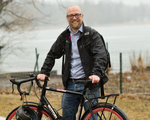

The city of Minneapolis declared a State of Climate Emergency in December 2019. The resolution (which passed the Minneapolis City Council unanimously) demanded a “massive-scale mobilization to halt, reverse, and address the consequences and causes of climate change.”
Ward 11 Council Member Jeremy Schroeder was one of the bill’s co-authors. In the last 15 months, he has continued to work for tougher environmental policies – and to help empower residents to take on climate action in their own lives.
Of the Climate Emergency Declaration, he said, “It affirms on the city level how real and serious the climate situation is. The declaration requires us to be more ambitious, more purposeful, and more attentive, but it’s tricky.
“For instance, one of the stated goals is to reduce city-wide carbon emissions by 80% by the year 2050. Truthfully, it’s a lot easier to reduce the first 25%. It gets harder after that. The good news is that every city department is on board with the Climate Emergency Declaration, because often climate action gets ‘siloed’ in the Office of Sustainability.”
Policy into action
Under the declaration, the city of Minneapolis pledged to establish a “social cost of carbon.” Schroeder described this as a way to measure the damage from carbon emissions to human health, food production, homes and businesses, and energy costs. He believes it is high time people factor those costs into long term planning.
The city of Minneapolis also committed to creating a sustainable building policy under a bill Schroeder co-authored. He said, “This means we can push for higher energy efficiency standards for buildings the city utilizes. This carries over into sustainable building materials, energy efficient heating and cooling systems, and ensuring that there are multi-modal ways of transit for people to get to city buildings.”
Schroeder wants to make sure people have the tools they need to make changes on a personal level, too. He authored a Residential Energy Disclosure that provides all Minneapolis residents – renters and home owners – reliable information about energy use in their homes, so they can make energy investments wisely.
In addition, Schroeder has championed the Green Cost Share for businesses and Inclusionary Financing for residents. These programs help small business owners benefit from Minnesota’s growing green economy, and provide low income residents the means to make cost-saving energy improvements. He said, “With information and support, our whole community can contribute to a cleaner, greener Minneapolis.”
Schroeder is trained as an electrical engineer, an attorney, and has served in leadership and board of director roles of several nonprofits.
He said, “Effective city leaders embrace the nitty-gritty details to ensure that policies enacted will work for everyone. In my many committee roles on the council, including as the chair of the zoning and planning committee and member of the city’s planning commission, I put this attention to policy details to work every day.”
Renewable technologies
are here
Schroeder is passionate about helping the city of Minneapolis get to 100% renewable energy by 2030. He said, “It is imperative that we accelerate our efforts to reduce, and ultimately eliminate, our dependence on fossil fuels.
He opposes the proposed natural gas plant proposed by Xcel Energy in Becker, Minn., and the Enbridge Energy Line 3 Pipeline Replacement Project. Citing that wind and solar costs keep dropping, Schroeder said, “We have the technologies right now; what we need is the political will to move fully away from fossil fuels. It’s not enough to be committed to the ideal. We need to act.”
Small actions add up
A word that gets used a lot in environmental policy work is the word “sustainable.” Schroeder doesn’t think it carries enough weight. He said, “Sustainable practices seek to maintain the same, whereas regenerative practices improve the condition or quality of something. We need to be doing so much more to combat climate change and create environmental justice.
“Everybody can contribute on some level, even if their starting actions are small. Try adding one action step at a time, and next year add one more. Lower the temperature of your home in winter by one degree; switch to LED light bulbs; drive less; turn off lights when you leave a room; switch off power strips when not in use. Small actions add up. We’re still living in a very extractive way, meaning that we take or extract far more than we give back to the earth.”
Council member Schroeder welcomes constituent comments and can be reached at jeremy.schroeder@minneapolismn.gov.
Comments
No comments on this item Please log in to comment by clicking here